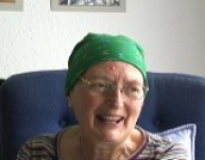Interview 06

More about me...
The GP did a blood test and two weeks later she was referred to hospital urgently for a biopsy under local anaesthetic. Unfortunately this was inadequate and a second biopsy arranged, this time under general anaesthetic. When she attended her GP a few days later to check how the wound was healing she was told the hospital suspected lymphoma. The surgeon telephoned her to confirm the diagnosis of diffuse large B-cell non-Hodgkin's lymphoma. She was thankful for the support of her niece who was with her at the time of that phone call.
Two weeks later she saw a specialist who recommended chemotherapy with monoclonal antibody (CHOP-R). The wait for treatment to begin seemed endless, during which time she was preoccupied by thoughts about the illness, and was relieved when finally given a date for treatment. She suffered no ill effects on the day of her first treatment, but experienced thick-headedness that lasted for the next two days, followed by slight headaches on waking for about five days. She started to lose her hair about two weeks after the first treatment. Other side effects were mild and included tiredness, sore gums and tingling fingers. She was able to continue with her Open University studies and after two treatments of six was surprised how well she felt.
She discovered her lump and her GP asked her to return in two or three weeks if it hadn't gone away.
She discovered her lump and her GP asked her to return in two or three weeks if it hadn't gone away.
Although she expected to feel sick after her chemotherapy, the anti-emetic tablets she was taking prevented any nausea or vomiting.
Although she expected to feel sick after her chemotherapy, the anti-emetic tablets she was taking prevented any nausea or vomiting.
When I first started treatment I had a bucket near me in the living room and took one upstairs to bed for two or three nights expecting to be sick. It never happened, I didn't have any feeling of nausea or sickness and I haven't since. And I feel I can't tell enough people this good news because so many people express surprise and astonishment that I haven't had any nausea or sickness.
You said you never had any nausea from this treatment?
No.
Did they give you anti-sickness drugs to take?
Oh yes.
And you're taking those?
I only take them for about five days after the chemotherapy session, that's all. So when I come home after chemotherapy session I have about four or five tablets which I take, but that's only that many tablets for about the first five days. After that I'm down to one tablet three times a day.
Had been given some information about complementary approaches but had felt no need to use any.
Had been given some information about complementary approaches but had felt no need to use any.
A friend did send me information from the Bristol Cancer Information Centre, which I did read but I don't feel that I have felt in need of relaxation tapes or the need to have special foods, I haven't a problem with my appetite. Apart from really one low point I haven't felt the need for encouragement to get me through, you know, I have felt quite positive about it and quite happy. But I can see that the Cancer Information Centre at Bristol would help people who have more aggressive cancers, who are suffering pain and other side effects. But fortunately I haven't felt the need for that. So no I haven't tried any complementary medicines.
Was given information about lymphoma first, and about the chemotherapy and side effects later - which gave her time to take in what was happening.
Was given information about lymphoma first, and about the chemotherapy and side effects later - which gave her time to take in what was happening.
So you had quite lot of information, did you feel it was about the right level of information or did you want more or was it too much?
I would say that was about the right level. I was glad they didn't give me information about chemotherapy and its possible side effects until later, because I had some time to try to digest what I had been given. Although I had quite a bit of information and I felt it was adequate, I still did have a look at the Cancerbackup website, Lymphoma Association website and the Oxford Lymphoma Group. And that was useful and I did find additional information and I guess it all helped me to feel that, well it's almost a common everyday occurrence. But I have relied most heavily on the information I was given at the hospital. Even then there was quite a bit to take in because the side effects can be different in different people and I was expecting, 'Well I might be this, I might be this, I might have this and I might have that', then when it came down to it I had very few.
And when did they give you the information about the chemotherapy, because you said you didn't have that straight away?
That was given to me when I went to the hospital for the bone marrow scan at the haematology unit and I met the registrar and the nurse there and she showed me, while I was in the day unit, the waiting room, told me it was quite a relaxed atmosphere in there, and there were patients having treatment sitting in chairs with drips in their arms, so that was when I was given the information about chemotherapy, which was two weeks before my treatment started.


